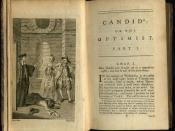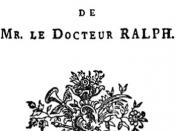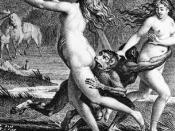Voltaire's Candide and John Beckett's Waiting For Godot relate with respect to the relationships between Candide and Cacambo and between Vladimir and Estragon. The characteristics of these two relationships possess similarities as well as differences. Both pairs' friendships and experiences as well as their philosophies share parallels and distinctions.
Both relationships are not based primarily in friendship, but rather in differing aspects such as dependence, servitude, and hope. Candide and Cacambo's friendship endures until their inevitable separation, whereas Vladimir and Estragon's friendship vacillates frequently as they go through their cyclic trials where they fight, reconcile, and then reemerge as friends. Vladimir and Estragon can be considered companions, but nothing more. Their daily disputes and quarrels, which center around whether they should remain together or not, illustrate their ambivalent and onerous relationship. The brevity of Vladimir and Estragon's on-and-off friendships contrasts greatly with Cacambo and Candide's lasting friendship.
During the time that Candide and Cacambo are together, they share a strong bond of friendship, unparalleled by that of Vladimir and Estragon, that endures even through the frequent adversities which they face while in the Americas. For example--when the South American natives capture Candide, Cacambo remains with him even though he easily could have escaped. Moreover, the long span of their relationship is indicative of their mutual trust and respect in each other. However, the friendship the two possess is not the exclusive reason for their union. Similarly, Vladimir and Estragon do not stay together just out of kinship, but rather stay together chiefly for companionship, a peripheral kind of friendship, and out of the hope that staying together will bring about good fortune. Candide depends on Cacambo greatly as a guide through the Americas. Without Cacambo there to lead him, Candide would become lost in the vast South American wilderness. Conversely, Vladimir and Estragon do not depend on each other in the slightest for survival--often, the two believe that they would be better off if each were alone. Cacambo has a unique reason for staying with Candide: servitude. Cacambo, accustomed to having a dominant and governing figure around him, guides Candide because of his necessity for a master. When Cacambo finds a new master, he willingly breaks off his ties with Candide, which is illustrated by Cacambo's aloof response to Candide's friendly greeting when the two meet again for the first time since their separation.
Both have philosophical views that transform over the duration of their experiences. Initially, Candide and Cacambo believe that their world is the best of all worlds from Pangloss' teachings. However, their understanding of life and existence are later refuted from gathered experience just as Vladimir and Estragon change their views on life and existence. Vladimir and Estragon come to acknowledge the fact that whatever they think they should do ought to be the course of action to take since nothing they do really makes a difference. They come to this conclusion after finding out that whatever they do will make no difference in their situation with waiting for Godot. Likewise, Candide and Cacambo come to a new understanding of life and existence after experiencing the extent of it in their travels through Europe and South America. Instead of keeping with the notion that everything is for the best as Pangloss overly reiterates, they adopt a new understanding--that the world is a flawed place full of treacheries and evils. The initial and consequent views the two pairs possess, however, are quite different in nature. Candide and Cacambo come to believe that they should work and expect the worst out of the world. In contrast, Vladimir and Estragon come to believe that they should do whatever they feel is right, without letting reasoning intervene in their judgment. Basically, they come to believe that acting through emotion rather than reason is the best way to go about life. Through their wait for Godot, they come to realize that nothing is certain, and that one cannot decide the best course of action by reasoning or rationalizing. In Estragon and Vladimir's situation, this understanding is all true; how ever they go about reasoning whether Godot will come, they will never know the truth. It is something that cannot be found through reasoning, as are many things in life. The philosophy adopted in Candide, however, differs with the philosophy that is expressed in Waiting for Godot. Candide at the very end states his final view on life and existence--that work alone can take them through life peacefully. One must not expect much from life, since the world is unpredictable and may cause one unmerited misery, Candide and Cacambo believe. Their abysmal view on life stems from their adverse experiences. Likewise, Estragon and Vladimir's understanding on the nature of life and existence stems from their intolerable wait for Godot.
Cacambo and Candide's experiences differ greatly with that of Vladimir and Estragon. Vladimir and Estragon's experiences together are very dull, whereas Cacambo and Candide's experiences are adventurous and exciting. One of the primary reasons why Cacambo and Candide's adventures are more exciting than those of Vladimir and Estragon is because of their influx of outside influences as opposed to Vladimir and Estragon's desolate and sparse setting. Cacambo and Candide meet new people and peoples quite often during their travels, but Vladimir and Estragon only meet very few new people while they wait for Godot. The two have such a boring time that they ponder suicide so that they can escape the banality of their lives. Candide and Cacambo, however, journey through unexplored lands, find the legendary city of El Dorado, and overcome numerous perils. Although both pairs' experiences differ a lot, these experiences are what shape their final conditions; both pairs transform in character due to the different things they experience.
Candide and Cacambo as well as Vladimir and Estragon have strained friendships, but friendships nonetheless. Their levels of friendship differ with Cacambo and Candide's being the stronger friendship of the two. Both pairs' experiences differ, yet are what establish both pairs' end state of mind, including philosophy, friendship, and character.






Good Essay...but
Just to let you know that "Waiting for Godot" was written by SAMUEL Beckett, otherwise good work, helped me out alot.
0 out of 0 people found this comment useful.